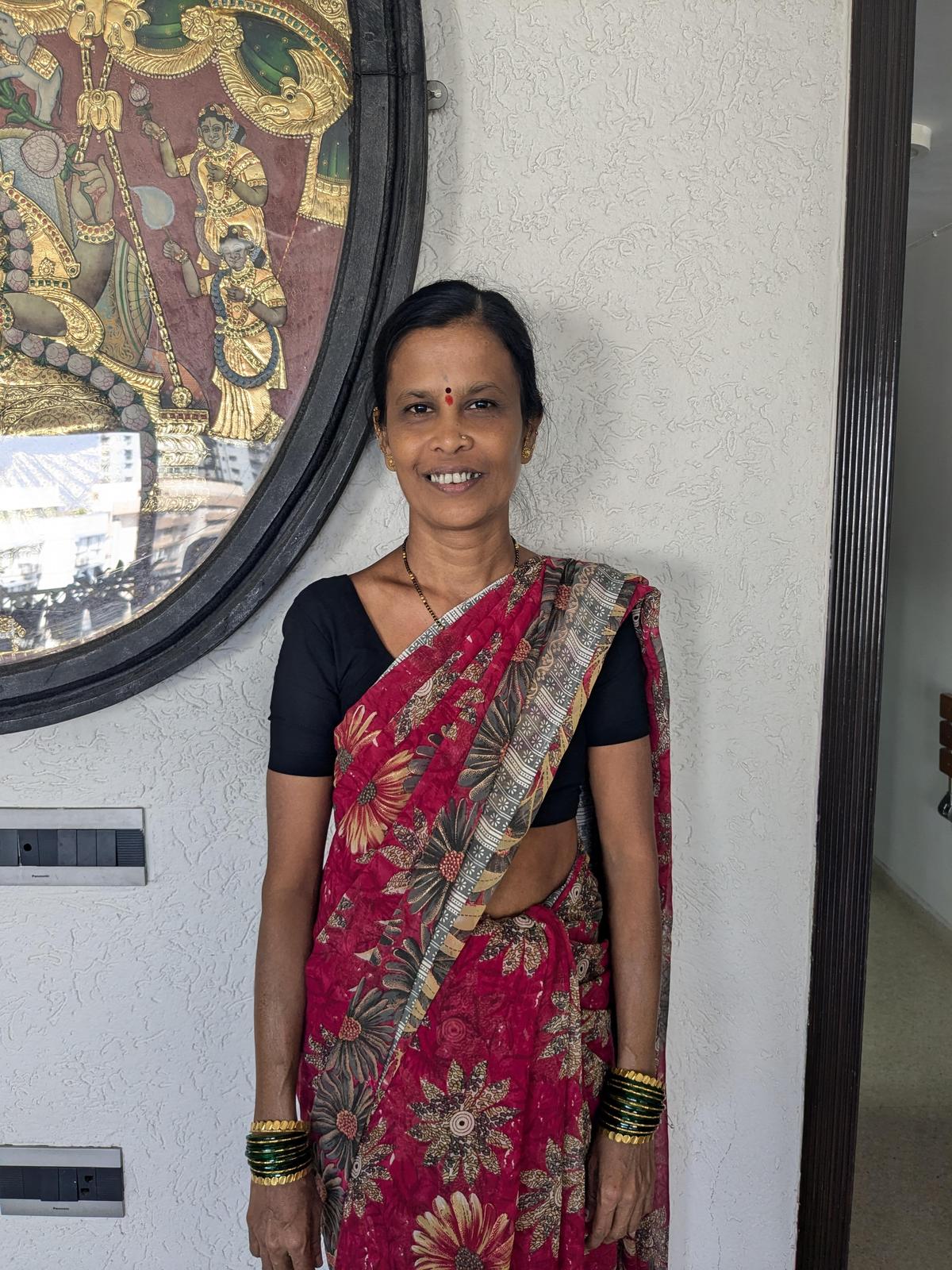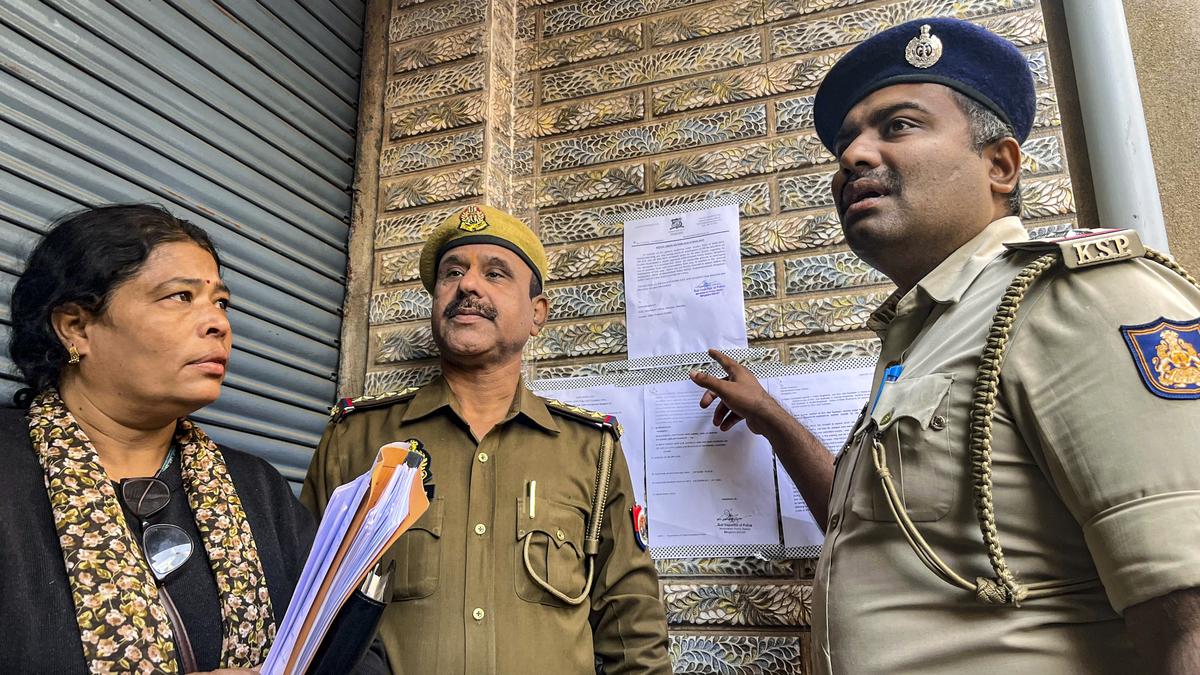
Police personnel paste a notice at the residence of Nikita Singhania, wife of engineer Atul Subhash, who ended his life in Bengaluru alleging harassment at the hands of his estranged wife and her family, in Jaunpur, Uttar Pradesh. | Photo Credit: PTI
Trigger warning: The following article has references to suicide. Please avoid reading if you feel distressed by the subject.
This week, Atul Subhash, a senior executive of a private company, died by suicide in Bengaluru, after leaving a note and a video accusing his wife and her family of asking for way more money for alimony than he could afford. The police filed an FIR against Subhash’s wife and three others from her family for ‘abetment of suicide’.
As soon as the news broke, people on social media went into a tizzy. Deepika Bhardwaj, a men’s rights activist, said: “#JusticeForAtulSubhash has created a storm & endless men are reaching out to us with stories more painful than the other”. A candlelight vigil was held for Subhash at Jantar Mantar by a group of men. One of the placards that caught my eye read, “Men are not an ATM.”
Men, like women, suffer the constrictions of stereotypes and face consequences if they choose to break out of them. That men provide, take care of household savings, and don’t cry at all, are all still the ‘norm’. Glancing at Indian matrimonial advertisements, you will find that men who conform to the ideals of ‘traditional masculinity’ – tall, engineer/doctor/MBA, earning well – are the most sought-after.
But the debate following Subhash’s death has unfortunately sought to portray men as the true victims of gender-based stereotypes and violence. Hundreds of users on X are demanding that the legal system be overhauled, claiming that it is “pro-women”. These demands are not new. Especially in the wake of the #MeToo movement, men’s rights movements have been rising the world over. Aggrieved men posted back then that they were scared to speak or crack jokes or even hug friends freely.
As Alok Prasanna Kumar pointed out, no law [and not just gender-based ones] can entirely prevent its misuse. While hearing a divorce settlement this week, the Supreme Court laid down eight factors that need to be taken into account while deciding the permanent alimony amount. Separately, it also urged the judiciary to exercise caution in dowry harassment cases to prevent misuse. Also, laws can be biased. As Soibam Rocky Singh reports in this piece, Section 69 of the Bharatiya Nyaya Sanhita, which is a clause on using “deceitful means” to promise to marry a woman, is facing the heat for its “gender bias, potential misuse, and implications on modern relationships”.
But by positing that hordes of vindictive women are out to slap men with false accusations, many people are seeking to turn systemic oppression on its head. There was no outrage at the 6,450 dowry deaths or the 4,963 cases of abetment to suicide of women, when the National Crime Records Bureau released the 2022 data.
Subhash deserves justice, just like any other person. But in our effort to empathise with his plight, and with that of other wronged men, it is crucial that we don’t undermine or altogether deny the struggles of countless women who continue to be victims of structural violence after centuries of abuse.
Helpline numbers: If you are in distress, please reach out to these 24×7 helplines: KIRAN 1800-599-0019.
Toolkit
Speaking of busting stereotypes, the book Three Centuries of Travel Writing by Muslim Women (Zubaan Books) does just that, as Rakhshanda Jalil writes in a review. In 45 essays, three editors gather multiple travel accounts by Muslim women “who, alone or chaperoned, veiled or unveiled, travelled for work or pleasure” before “the ‘jet age’ transformed modern mobility.” The book documents their observations of the new and the unexpected, and of various aspects of life, including religious and social practices.
Somewhere somehow someone said something stupid
“Your mother must be from [the] red light area. Go and complain to the court that I said this.”
D.K. Goel, Founder and Chairperson of FIITJEE, on being asked by an employee about investments in the Edtech sector
Wordsworth
Spinster: While the term has been retired in most parts of the world, it is being reclaimed by a few women. Spinster was originally used to refer to someone, generally a woman, who spun yarn or thread. It then became associated with unmarried women. It acquired more negative connotations to mean women are sexually undesirable, or to deride women who remained single. On the other hand, the equivalent term for men, bachelor, is associated with being carefree and happy-go-lucky. However, a recent study in Social Psychological and Personality Science shows that “single women are happier than single men”.
Sources: Forbes, Women’s Health
Women we met
Surekha is a domestic worker in Mumbai. The most important symbol of empowerment for her is to have her own house, a “roof over my head”. She has a daughter, who is educated. In Surekha’s household, her husband takes care of the finances and she of the household; she doesn’t want this for her daughter. “She should be able to make her own decisions,” she says. And a thing she wishes for? A loan without a collateral so she doesn’t have to consult her husband every time she borrows from the bank.

Published – December 14, 2024 03:11 pm IST


